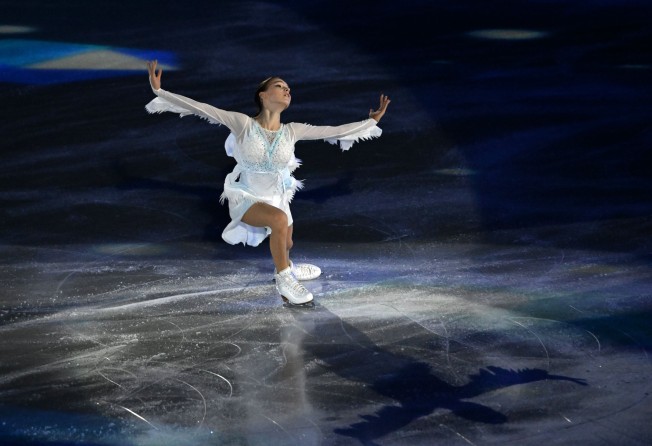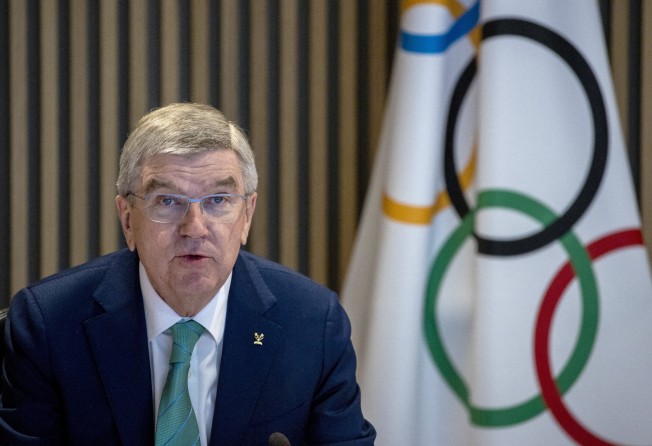
Olympics chief Thomas Bach ‘faces dilemma over Russian athletes’
- Olympic authorities banned Russian athletes following Moscow’s invasion of Ukraine, but are exploring options to compete in 2024 Games
- Ukrainian president Volodymyr Zelensky claimed 184 Ukrainian athletes have died since invasion and called for “total isolation” of Russia and Belarus

Olympics chief Thomas Bach faces “the toughest decision of his presidency” as he weighs whether Russian and Belarus athletes should be allowed to compete in the 2024 Games, a senior former IOC executive has revealed.
The signs coming from bodies such as the Olympic Council of Asia (OCA) and the US Olympic and Paralympic Committee (USOPC) in the past fortnight suggest athletes from Russia and its ally Belarus should be permitted to try and qualify for the Games in Paris.
The International Olympic Committee has agreed to “explore” a proposal allowing athletes from those countries to compete in international events in Asia.
Olympic authorities had banned them following Moscow’s invasion of Ukraine and those federations who have allowed athletes from those countries to take part have insisted that they do not display national emblems.

The argument given was that the events’ integrity would be damaged by the athletes competing.
However, the IOC said this month that both the OCA and some International Federations “on the Asian continent” believe “the reasons for the protective measures no longer exist”.
The softening of their attitude enraged Ukrainian President Volodymyr Zelensky, who called Bach.
Zelensky claimed 184 Ukrainian athletes have died since the Russian invasion and called for the “total isolation” of Russia and its ally Belarus.
The IOC’s former marketing chief Michael Payne – who was credited with overhauling the movement’s brand and finances – said Bach faces a conundrum.
“It is probably the toughest decision that Bach is facing in his presidency,” Payne said. “He and the IOC are caught between a rock and a hard place.”
Another former IOC marketing executive, Terrence Burns, an American who has since played a role in five successful Olympic bid campaigns, said one problem was that the Ukraine war had gone on for much longer than expected.
Burns said the change in the IOC’s stance was not a “retreat or softening”.
“The IOC’s very reason for existence is to use sport as a unifying platform – perhaps the only one – and to keep and hold the world together,” he said.
“I see it as a pragmatic evolution of direction in an almost no-win situation. Principles and values matter, no matter how unpopular they are when applied.”
Payne, who is Irish, said the IOC has to view the attitudes to the Ukraine conflict through a multicultural prism.
“One can’t look at this purely through the culture of an Anglo-Saxon viewpoint,” he said.
“There is no question Asian culture views what is happening slightly differently from the West.
“If you are a global body you cannot allow yourself to only look at something through only one cultural prism.”
Payne argued that the “one size fits all” model of punishing nations was not practical.
“As horrific as the Ukraine-Russia war is, it is not the only one going on at the moment,” he said. “If you are looking at it from an Asian perspective, how do some of the American adventures in the Middle East play out?”
Bach had also spoken about the participation of Russian and Belarus athletes being politicised by some governments and called for a return “to sporting merits”.
Burns said their case should be looked at more positively when taking into consideration by their respective governments.
“Do a nation’s citizens have a responsibility for their government’s actions?” Burns said.
He said while that might be the case “in a fully-functioning open democracy”, but: “In a totalitarian/police state with little to zero ability to demonstrate, and by doing so risking imprisonment or death, I would argue “no. That is where we are with the Russian conundrum.”
Burns said the awarding of the Olympic Games to places like China and Russia “virtually guarantees the mingling of sport and politics.”
“It is inevitable and to believe otherwise is nonsense,” he said.
“I think the IOC’s charter – believe it or not, like it or not, respect it or not – is based on principles that differ from popular geopolitical rhetoric.”